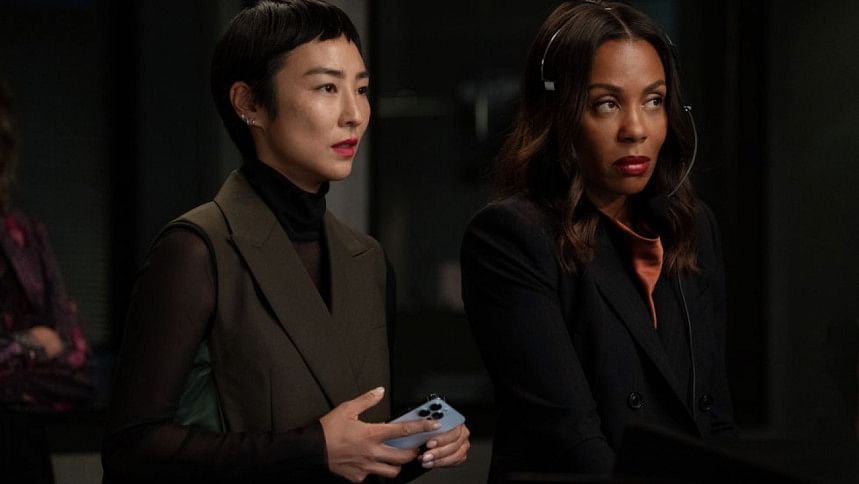‘The Morning Show’ Season 3: Hodgepodge of media politics and superficial connections

Apple's debut series, "The Morning Show", began with aspirations of widespread success, by reflecting the cultural revolution. Real-life reflections have long been a hallmark of this show as Season 1 focused on the #MeToo movement, and Season 2 shed light on the beginning of the pandemic. It has also consistently kept a close eye on current affairs, but its efficacy in addressing those problems has been uneven. Season 3 is a two-year shift from where the last season ended, with data breaches, the Russia-Ukraine war, and internal politics being the overarching themes.
The threat posed by Big Tech and the ability of billionaires to acquire and destroy UBA (the broadcast TV network in the show) is uncannily similar to Elon Musk's acquisition of Twitter/X. With the writers' strike in Hollywood, the issues of legacy media's survival, the UBA board's corruption, and the crew's dissatisfaction with their working circumstances are more important than ever.

Tired of answering to vapid board of directors, Cory, the CEO of the company, conspires against them as he plans to sell UBA to Paul Marks, a tech mogul portrayed superbly by Jon Hamm. Cory is played by Billy Crudup, whose amiable yet aggressive nature makes for the most captivating performance. The strongest indication yet that Cory has a decent spirit beneath his toughness is his tormented bond with Bradley, which is put to the test once more in Season 3.
Cory often takes on the role of the lead character, particularly in the first part of Season 3. This is an unusual and vexing decision for a show that grew by starring two female leads – Alex and Bradley (played by Jennifer Aniston and Reese Witherspoon). In Season 1, Alex and Bradley's complex relationship was the focal point of "The Morning Show". The dynamic, flawed, and nuanced roles of the lead duo were a pleasure to watch as these female journalists were making a name for themselves in a male-dominated media landscape. However, the new season cuts back on this powerhouse partnership.
This season of "The Morning Show" explores more recent relationships, which are also fascinating. The friendship between Stella, president of UBA's news division and Mia, producer of Bradley's show, might be the most wonderful and surprising. It's nice to watch the two otherwise background characters get the spotlight for the first time so that their insights into the lingering problems in the company shine through. Paul is a new character this season and he's a wise addition because he adds a compelling and unexpected plot, which in turn deepens the backstory for more seasoned characters like Stella and Cory.

One of the most horrific and unforgettable instances is when Stella is forced to choose between closing a significant deal with two powerful yet sexist advertisers and staying true to her morals. Her decision leaves a lasting impact that causes her to feel pressured to make the same area of decisions repeatedly. Alex, too, must negotiate her unstable feeling of authority after becoming connected with a powerful man. "The Morning Show" does a good job of delving into the numerous double standards across the industry, in an engrossingly sophisticated manner.
The third episode of the season is particularly noteworthy; it centres on a crisis caused by a hack that reveals an email sent by board member Cybil where a racist joke about one of UBA's journalists is made. When that very same journalist interviews Cybil, she does so by treading the fine line between asserting her rights and holding Cybil and the network responsible. It's a no-brainer to cheer for the journalist as she delivers a nuanced, energetic, and frequently devastating performance as per the tone of her dialogues. Then again, Cybil's sobering character study of a damaged mother tenaciously holding onto her family's legacy almost makes the audience forgive her for her ignorant comment.
"The Morning Show" now seems to be trying to emulate the elements that made the hit HBO show "Succession" work. The classical music that plays before Alex pulls out a coup in TMS or the incessant need to portray the notoriety of the American media industry are the clear signs. "Succession" skillfully maintained an equilibrium between distinct plotlines and ensured that the immense wealth of its characters did not diminish the audience's ability to empathise. On the other hand, "The Morning Show" rushes storylines by overlooking the impracticalities and sweeping consequences of events, under the rug.

 For all latest news, follow The Daily Star's Google News channel.
For all latest news, follow The Daily Star's Google News channel. 









Comments